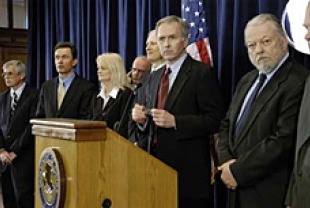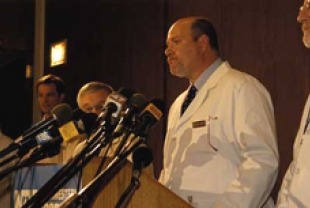For years, science fiction writers have used speculative fiction to present events and trends in the future. Fans have been able to read the map and point to familiar landmarks. In this daring docudrama, English director and co-writer Gabriel Range examines the assassination of George W. Bush on October 19, 2007, by an unknown shooter. This fictional documentary is broadcast a year later. The use of archival footage and interviews provides a rounded picture of the major players in the tragic event and the FBI's hunt for the assassin.
President Bush is in Chicago to give a speech to a friendly crowd of the city's economic leaders. But his motorcade has to pass through a very angry crowd of 12,000 demonstrators who have been pushing against police barricades. During a skirmish, several of these people manage to break free and run down a side street, although they are captured by the security cameras.
Bush is well-received inside the hotel where he speaks about patriotism. But the secret service agent in charge of protecting the President strongly suggests that in light of the unruly street demonstrations, he should not walk the rope line on the way out of the hotel. But his opinion does not prevail and shortly afterwards President Bush is shot twice by an unseen assassin. He is taken to the limousine and driven to Northwestern Hospital as chaos erupts on the scene.
By the time the President dies from his wounds, an investigation is already underway: it is determined that the shooter was on the twentieth floor of a building across the street from the hotel. A rifle is found along with two spent shells. In a series of interviews, a FBI investigator, a police commissioner, a journalist, and secret service agents tell what happened from their perspectives. A woman who is a presidential advisor and speechwriter shares what a great and charismatic leader Bush was and that he was doing God's work.
Death of a President puts on the screen many of the shadow issues that divide America and have caused such ideological upheavals during the past five years. The hatred of the crowd of protesters, the anger in their voices and body language, is not a pretty thing to watch. Equally disconcerting and unappealing is the xenophobia evident in the remarks of a law enforcement official who immediately targets people with Arabic-sounding names as the logical suspects in the assassination investigation. When Jamal Abu Zikri is arrested and turns out to be a Syrian who traveled to Pakistan and Afghanistan, the government and the legal apparatus swing into high gear claiming that he is a terrorist connected with Al-Qaeda. Soon President Cheney is pressuring Syria, and the Patriot Act III is enacted to give the government further power to fight domestic terrorism.
But do they have the right shooter and does it make any difference? No movie can dispel the divisiveness afoot in America today but any drama that tries to depict the shadow elements in this uncivil and combative culture deserves a serious viewing.

